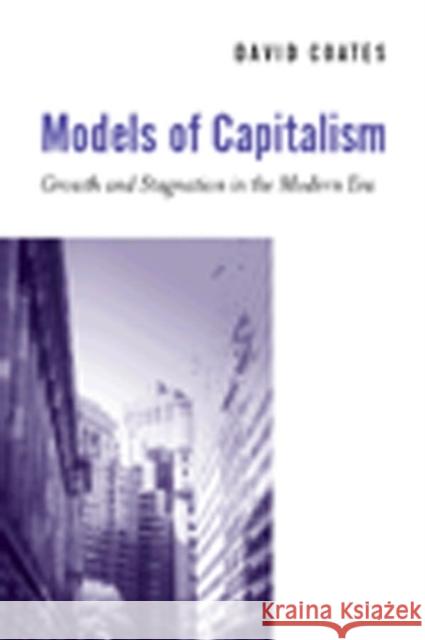Models of Capitalism » książka



(netto: 97,55 VAT: 5%)
Najniższa cena z 30 dni: 101,80
ok. 30 dni roboczych.
Darmowa dostawa!
The contemporary debate on economic policy is dominated by the issue of 'which model of capitalism works best'.
′A brilliantly comparative analysis of the contradictions that beset all the various capitalist models amidst globalization today as well as of the mode of thinking that limits our perspective to choosing among them. A must read for everyone doing work in comparative and international political economy, and for all those concerned with finding a new way forward for labour movements and the left.′
Leo Panitch, Distinguished Research Professor of Political Science, York University, Toronto
′This is a truly remarkable and phenomenally important book. I can only marvel at the breadth of coverage, the prescience of the analysis and of the issues raised, the accessibility of the text and, above all, the depth and sophistication of the argument. In an age of sound–bite politics and, worse still, sound–bite political analysis, this book is likely to become an enduring classic. It clearly bears comparison with Shonfield′s magisterial Modern Capitalism. In a way, rather like Shonfield′s book, this is simply so good as to be accessible to a very wide audience.′ Colin Hay, Department of Political Science and International Relations, University of Birmingham
′Focusing on the US, UK, German, Japanese and Swedish economies, this very clearly written book examines the differences between their economic and political and cultural systems and sets out to show which of them worked best in the post–war era and the reasons for their comparative success or failure.′ Labour Research
′The empirical chapters represent a useful, accessible synthesis of research on economic growth from political scientists, economists, and sociologists. And the book certainly delivers on its promise of being a provocative contribution to the ongoing discourse of thinkers on the Left.′ Political Science Quarterly
′The systematic arrangement of the book makes it accessible to non–specialists ... Through its use of recent literature, the book is also useful to business historians as a survey.′ Business History
′Confused by the theoretical proliferation of the past decade within the economic social sciences? ... Coates′ book will be useful to those who are interested, challenged or just plain confused by all the debates ... The book provides a convenient entry point into a range of debates, a detailed guide to the nuances within the literature, as well as a pointer to the broader literature about the relationship between economic regulatory systems and the political economy of industrial relations in a transforming economic marketplace. It is well worth a look.′ The Journal of Industrial Relations
"...quite the best overview of recent debates in political economy that I have seen. I finally have a book I can assign in my "comparative capitalisms" course without flinching." Professor Vivek Chibber, Sociology Department, New York University
Preface.
1. Capitalist Models and Economic Growth.
Part I: Capitalist Models: The Arguments: .
2. Liberal Capitalism: Retreat and Revival?.
3. ′Trust–Based′ Capitalism: Revival and Retreat.
Part II: Capitalist Models: The Evidence: .
4. The Power of Organized Labour.
5. Education, Training and Culture.
6. The Organization of Capital in the Pursuit of Growth.
7. The State as an Element in the Growth Equation.
Part III: Conclusion: .
8. Capitalist Models and the Politics of the Left.
Appendix: Theories of Growth.
References.
Index.
David Coates is Worrell Professor of Anglo–American Studies at Wake Forest University, Winston–Salem, North Carolina.
The contemporary debate on economic policy is dominated by the issue of ′which model of capitalism works best′. Which model/models worked best in the past? Which, if any, will work best in the future? This wide–ranging and ambitious study offers the first systematic and multi–disciplinary answer to these key questions. Focusing on the US, UK, Japanese, German and Swedish economies, it documents the degree to which the postwar performance of each was affected by the strength of labour movements, the quality of education and training, the dominance of particular cultural systems, the organization of industry and finance, and the role of the state. In so doing, it effectively challenges prevailing orthodoxies on how capitalist economies function, and demonstrates the inadequacy of existing policy mixes.
Wide ranging in its scholarship and radical in its argument, Models of Capitalism brings the story of each leading economy up to the new millennium and into the age of global capital. It explores the impact of globalization on each model in turn, and explains the diminution in labour rights and working conditions which is now evident in all of them. Breaking down the barriers between social science disciplines and written in a style accessible to the general reader, this study is destined to become a major point of reference for those seeking civilized ways of organizing economic activity in the twenty–first century.
This book is suitable for second– and third–year undergraduate students and postgraduate scholars in political science, economics, management studies and sociology, including those pursuing courses on political economy, industrial relations and trade unions.
1997-2026 DolnySlask.com Agencja Internetowa
KrainaKsiazek.PL - Księgarnia Internetowa









